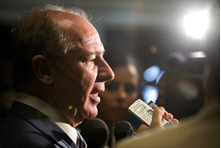
Typical street scene in Santa Ana, El Salvador. (Photo: iStock)
IMF Survey: De Rato Charted New Course for IMF
October 31, 2007
- Reshaped IMF's strategic direction; began governance, financing revamp
- Deepened integration of financial sector issues in IMF's work
- Saw IMF modernize its bilateral economic surveillance procedures
Rodrigo de Rato steps down as Managing Director on October 31 after three-and-a-half years at the helm of the IMF, during which he helped chart a new course for the 185-member international institution at a time of rapid shifts in the global economy.

Rodrigo de Rato: ninth Managing Director of IMF, presided over institution at time of rapid change (IMF photo)
MANAGING DIRECTOR'S DEPARTURE
The 58-year-old former Spanish Economy Minister reshaped the IMF's strategic direction and began to revamp its governance and financing by securing agreement on a new Medium-Term Strategy (MTS) for the IMF, approved in September 2005.
The strategy was designed to modernize the IMF and better align its activities with a globalized economy, a process now expected to be reinvigorated by incoming Managing Director Dominique Strauss-Kahn of France, who has pledged to reform the multilateral institution that oversees the global economy.
"A river of reforms is flowing from the MTS, and it's not over," said First Deputy Managing Director John Lipsky at a farewell reception for de Rato.
Strategic leadership
During the Annual Meetings of the Fund's global membership in Washington on October 20-22, the IMF's key policy-setting panel—the International Monetary and Financial Committee (IMFC)—paid tribute to de Rato's "skillful and strategic leadership."
De Rato had deepened the integration of financial sector issues in the Fund's work and launched a "bold reform" to strengthen the voice and representation of low-income and emerging market countries, the IMFC said. It noted that under de Rato the IMF had modernized its bilateral economic surveillance procedures and successfully introduced a new multilateral consultation process. The first such consultation, on global imbalances, resulted in policy plans by the United States, China, the euro area, Japan, and Saudi Arabia aimed at reducing global imbalances while maintaining economic growth. He also received an accolade from the IMF's Executive Board that passed a formal resolution of thanks for his service on October 29.
Under de Rato, the IMF was the first international institution to implement the Multilateral Debt Relief Initiative in January 2006 that cancelled billions of dollars of debt to the IMF of several low-income countries, enabling them to spend more money on poverty reduction.
Changing IMF role
De Rato, the ninth Managing Director of the IMF, presided over the Fund at a time of rapid change, dealing with issues ranging from debates about the IMF's continued relevance in a world of huge private capital flows that dwarfed the Fund's resources to issues associated with the rise of big dynamic economies such as China, Brazil, and India, and fallout from the latest market turbulence.
De Rato launched a process to give emerging market countries and developing nations a bigger say in the running of the Fund. After an initial round of ad hoc increases announced at the Annual Meetings in Singapore in 2006 for four dynamic economies that were clearly underrepresented (China, Korea, Mexico, and Turkey), the IMF has now embarked on the second and more far-reaching phase of the reform process, with completion envisaged by next year.
He also led the effort to look for a new income model for the IMF that would make it less dependent on revenue from lending.
More to be done
"De Rato has moved the Fund into first place in the competition to reform the multilateral system," said Dennis de Tray at the Center for Global Development in Washington. "Of course, a great deal more needs to be done (a few more voting shares for China and other emerging market economies is not going to solve the governance problem, but it's a start), but de Rato was instrumental in moving the Fund from a state of denial to an institution having an active and productive debate about its own future."
Working at the IMF was, de Rato told the IMF-World Bank Annual Meetings, "one of the highest honors of my life."
"Of course, a Managing Director of the Fund does not own it: he just looks after it for a while, and in the best case helps a committed staff and an engaged membership to work in harmony," he stated. "I see the reforms that we have begun under the Medium-Term Strategy as part of an evolutionary process, one that began before I came here and will continue after I leave."
Rodrigo de Rato's Tenure: 2004-2007
Highlights of the IMF's work under de Rato


